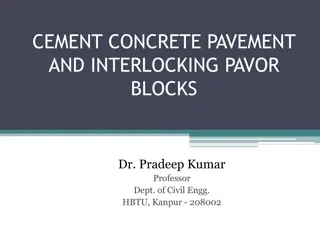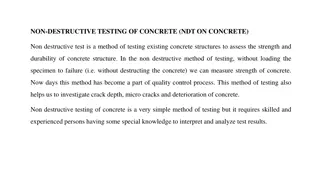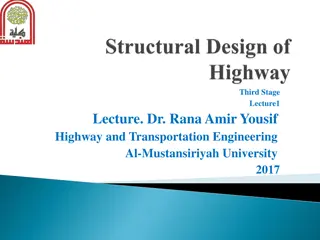Concrete Parameters
In this presentation, we delve into the intricacies of cryptographic assumptions, specifically factoring-based and Dlog-based assumptions. We examine the complexity of these problems and the best possible algorithms for factoring and discrete logarithms. Understanding the algorithms for factoring and dlog in different groups is crucial for ensuring the security of cryptographic systems.
Download Presentation

Please find below an Image/Link to download the presentation.
The content on the website is provided AS IS for your information and personal use only. It may not be sold, licensed, or shared on other websites without obtaining consent from the author.If you encounter any issues during the download, it is possible that the publisher has removed the file from their server.
You are allowed to download the files provided on this website for personal or commercial use, subject to the condition that they are used lawfully. All files are the property of their respective owners.
The content on the website is provided AS IS for your information and personal use only. It may not be sold, licensed, or shared on other websites without obtaining consent from the author.
E N D
Presentation Transcript
Concrete Parameters Slides by Prof. Jonathan Katz. Lightly edited by me.
Concrete parameters? We have discussed two classes of cryptographic assumptions Factoring-based (factoring, RSA assumptions) Dlog-based (dlog, CDH, and DDH assumptions) In two classes of groups All these problems are believed to be hard, i.e., to have no polynomial-time algorithms But how hard are they, exactly?
Disclaimer The goal here is just to give an idea as to how parameters are calculated, and what relevant parameters are In practice, other important considerations come into play
Security Recall: For symmetric-key algorithms Block cipher with n-bit key security against 2n-time attacks = n-bit security Hash function with 2n-bit output security against 2n-time attacks = n-bit security Factoring of a modulus of size 2n (i.e., length n) using exhaustive search takes 2n/2 time Computing discrete logarithms using exhaustive search in a group of order 2n takes 2n time Are these the best possible algorithms?
Algorithms for factoring There exist algorithms factoring an integer N that run in much less than 2 N /2 time Best known algorithm (asymptotically): general number field sieve Running time (heuristic): 2O( N 1/3 log2/3 N ) Makes a huge difference in practice! Exact constant term also important!
Algorithms for dlog Two classes of algorithms: Ones that work for arbitrary( generic ) groups Ones that target specific groups Recall that in some groups the problem is not even hard
Algorithms for dlog Best generic dlog algorithms in a group of order 2n take time 2n/2 This is known to be optimal (for generic algorithms)
Algorithms for dlog Best known algorithm for (subgroups of) *p: number field sieve Running time (heuristic): 2O( p 1/3 log2/3 p ) For (appropriately chosen) elliptic-curve groups, nothing better than generic algorithms is known! This is why elliptic-curve groups can allow for more-efficient cryptography
Choosing parameters As recommended by NIST (112-bit security): Factoring: 2048-bit modulus Dlog, order-q subgroup of *p: q =224, p =2048 Addresses both generic and specific algorithms Dlog, elliptic-curve group of order q: q =224 bits Much longer than for symmetric-key algorithms! Explains in part why public-key crypto is less efficient than symmetric-key crypto























